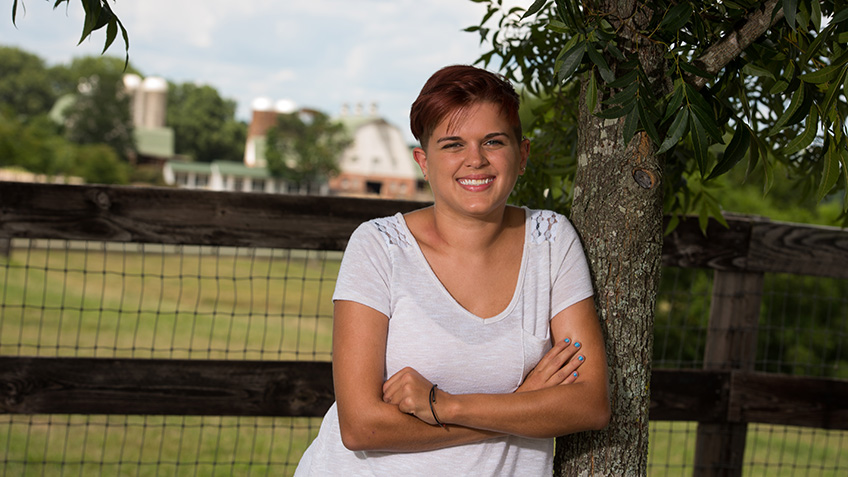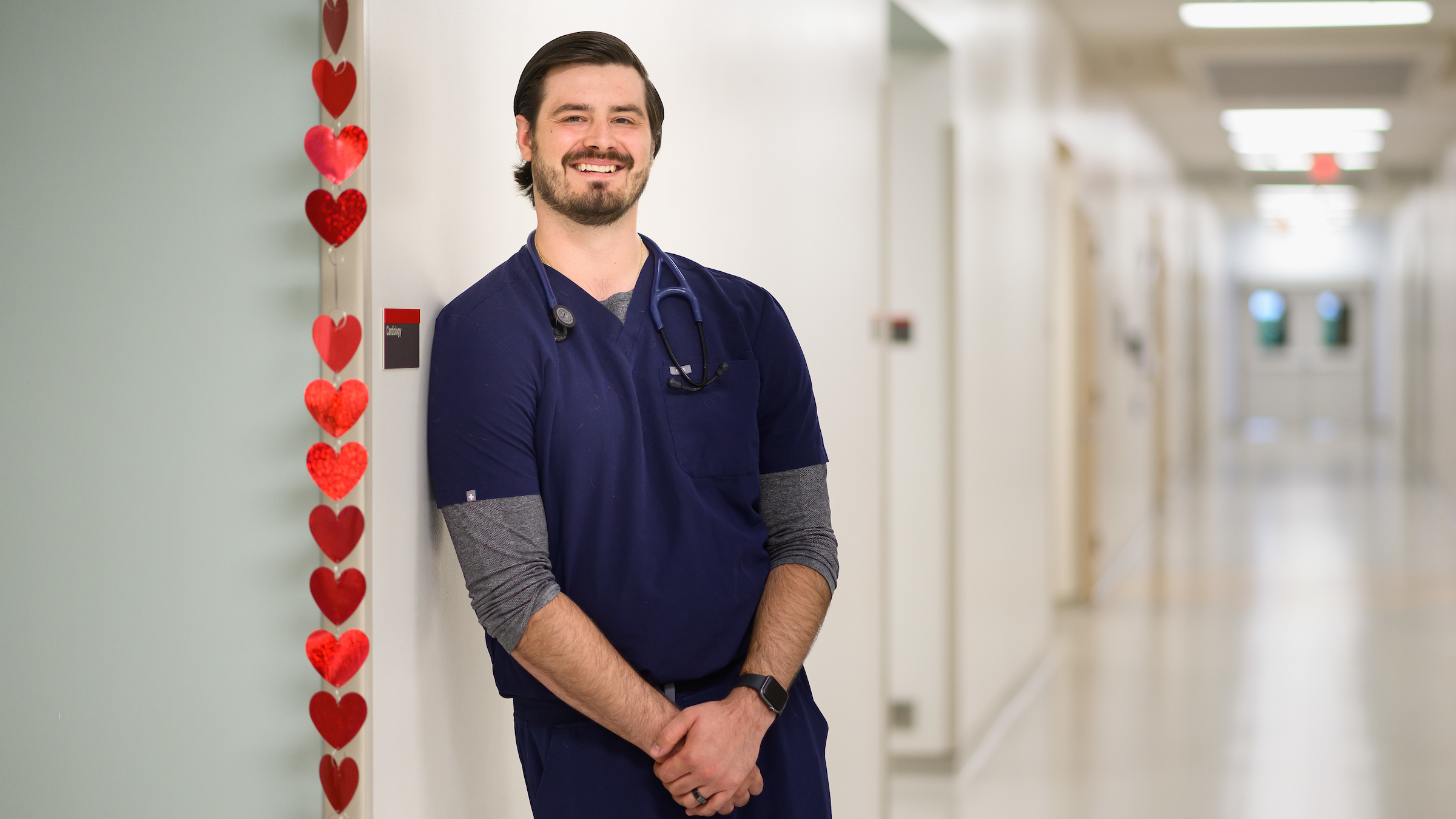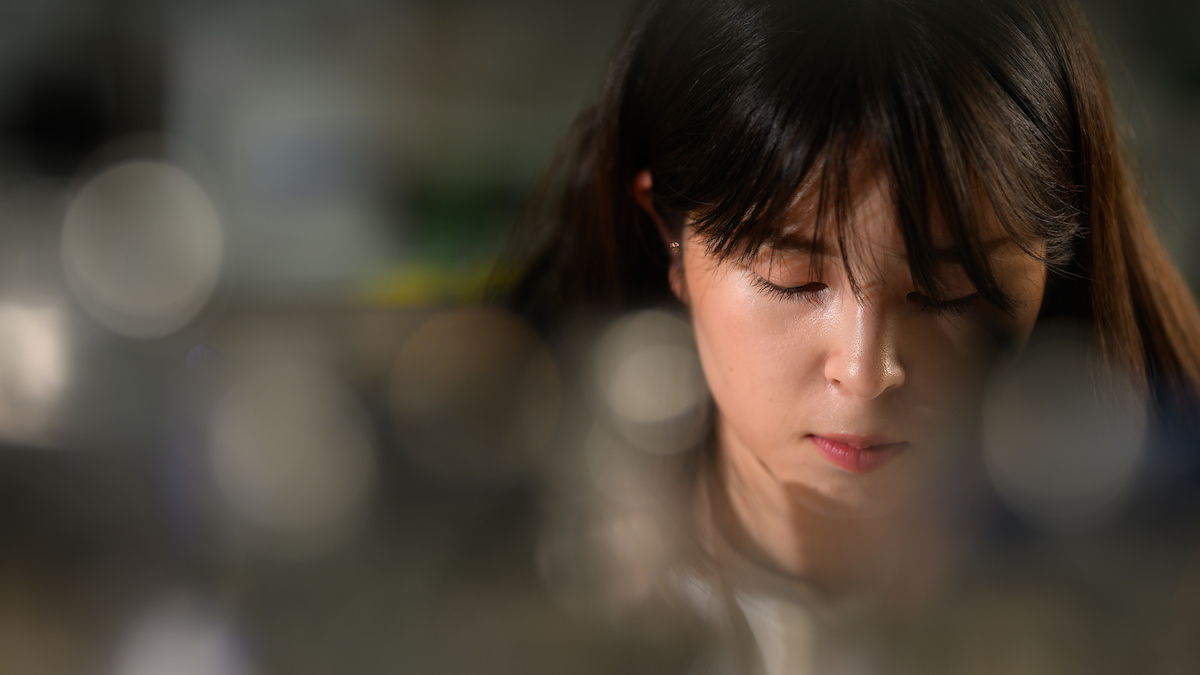Class of 2020: A Fresh Perspective

In a veterinary world of cats and dogs and cows and horses, Taylor Locklear embraces the komodo dragon.
Forget the warm fuzzies — especially the warm part. Locklear most wants to work with amphibians and reptiles, even ones that are venomous, 10 feet long, 150 pounds and could knock her over with their tail.
“I like the creepy-crawlies,” says Locklear. “I like the stuff that other people don’t like.”
Snakes?
“Snakes! Love snakes. I have geckos. I love that stuff,” she says. “That was always my favorite thing when I was working at the zoo. Other people would be like, ‘Look at this cute, cuddly creature.’ And I’d be like, ‘But I have a ball python! Come see it!’
[cvm_video id=”JHOv_k8t5Ko”][/cvm_video]
Locklear, 22, who graduated in May from East Carolina University with a degree in biology, joins North Carolina State University’s College of Veterinary Medicine class of 2020 with an infectious enthusiasm for zoological medicine and herpetology. Even if you can’t stand the sight of a darting salamander or shudder at the thought of facing a snake in your backyard, you feel inspired by Locklear’s appreciation for the animals.
Even if you don’t want to look at them, you have a desire to watch Locklear work with them.
It’s all part of a general love for animals (yes, even non lizard-y ones) that developed early for Locklear, a Fuquay-Varina native. At 6 years old, she went from wanting to be in the circus to deciding that a veterinary career may work out a bit better. Her parents didn’t believe in having a house without a dog. By grade school, she was giving insulin injections to the family’s diabetic pet cat.
Early veterinary skills were honed during her time at Noah’s Landing, a nonprofit zoo in Coats, about 15 miles south of Fuquay-Varina (it’s now called the Animal Ed.ventures Sanctuary). Locklear started out attending summer camp there, eventually upgrading to counselor and then to camp director. She spent years shadowing zookeepers, watching routine check-ups and how they interacted with animals. She fed animals and cleaned cages.
“I was like, ‘This is it,’ says Locklear. And then getting to work with their vet, I thought, ‘You have an awesome job. That’s what I want to do.’
The no-day’s-the-same thrills of working with the most exotic of exotics is endlessly appealing to Locklear, more so than, say, working at a clinic where the work felt a bit redundant. “It was, dog, cat, spay, neuter, vaccines, every day,” she summarizes.
[pullquote color=”green”]”I like that connection to that other person of, I’m going to take care of your critter. We’re gonna get them better.” [/pullquote]
But she has also developed an overall appreciation for clinical work (she has shadowed at vet clinics in Rolesville and Greenville), especially the responsibility of pet care. “There’s just an extra level of excitement to get into that depth with an animal,” she says. “Feeding animals and cleaning cages is one thing, but to be responsible for that animal’s course of life … I like that connection to that other person of, ‘I’m going to take care of your critter. We’re gonna get them better.’”
There was no other choice for her, she says. Vet school was it. As one of 20 EC Scholars, Locklear received a full ride to East Carolina University. In biology classes and through clinic shadowing she started gravitating toward surgery. “I love surgery,” she says very matter-of-factly. “I love the intensity and how detailed and tactful it is.”
And she found time for the outdoors. An ice hockey player in high school, Locklear shifted to rock climbing in college.
Yeah, Locklear’s pretty fearless.
“After you rock climb and you make some mistakes rock climbing, not a lot of things scare you,” she says. “And komodo dragons aren’t quite as a scary as rock climbing to me.”
Vet school doesn’t necessarily scare her either. She knows that CVM will be challenging, she says. But upon entering the next four years of her life she feels, in one word, “complete.”
And she also feels welcomed. She says she had felt that as a zoo med student she’d be the odd man out. Then she got a call from Dr. Suzanne Kennedy-Stoskopf, a zoological medicine research professor at CVM. “She said, ‘I saw you were interested in zoo med. Here’s some opportunities for you,’” she says. “That was a big thing to me — a professor contacting me.”
[pullquote color=”green”]“For me a lot of it is not only adding to the current N.C. State community, but to bring a little bit of that back to the Lumbee community” [/pullquote]
Working at a zoo would be a dream job for Locklear; she worked behind the scenes at the North Carolina Zoo as part of a teen program. Her passion for reptiles and amphibians is clearly not going away. Her college research project? Studying threatened Florida sand skinks.
When it comes down to it, she likes working with herpetological species because she gets to experience things with them that people think are not possible. “You can form pet connections with them as your animals,” she says. “There are a lot more things to learn about them.”
Beyond adding a zoo med outlook to campus — and instilling a love for animals many consider unlovable — there’s another perspective Locklear hopes to bring to N.C. State. She’s a member of the Lumbee tribe, and there’s not many Lumbees in vet schools, she says. Though she didn’t grow up immersed in the culture these thoughts have been on her mind: I’m Lumbee. I’m representing my tribe.
“For me a lot of it is not only adding to the current N.C. State community, but to bring a little bit of that back to the Lumbee community,” Locklear says. “A lot of different racial communities tend to get kind of isolated in their comfort zone and each other and ‘this is how we act and who we hang out with.’
“By Lumbees going out and trying different experiences, it kind of breaks that barrier.”
~Jordan Bartel/NC State Veterinary Medicine
- Categories:


